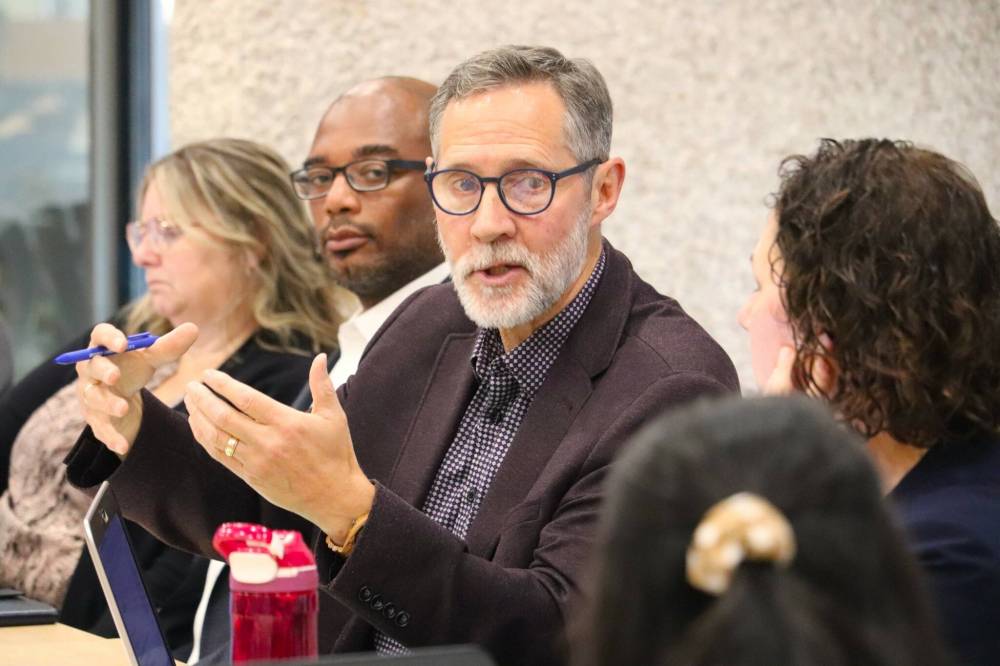Manitoba’s universities and this election
Advertisement
Read this article for free:
or
Already have an account? Log in here »
To continue reading, please subscribe:
Monthly Digital Subscription
$0 for the first 4 weeks*
- Enjoy unlimited reading on winnipegfreepress.com
- Read the E-Edition, our digital replica newspaper
- Access News Break, our award-winning app
- Play interactive puzzles
*No charge for 4 weeks then price increases to the regular rate of $19.00 plus GST every four weeks. Offer available to new and qualified returning subscribers only. Cancel any time.
Monthly Digital Subscription
$4.75/week*
- Enjoy unlimited reading on winnipegfreepress.com
- Read the E-Edition, our digital replica newspaper
- Access News Break, our award-winning app
- Play interactive puzzles
*Billed as $19 plus GST every four weeks. Cancel any time.
To continue reading, please subscribe:
Add Free Press access to your Brandon Sun subscription for only an additional
$1 for the first 4 weeks*
*Your next subscription payment will increase by $1.00 and you will be charged $16.99 plus GST for four weeks. After four weeks, your payment will increase to $23.99 plus GST every four weeks.
Read unlimited articles for free today:
or
Already have an account? Log in here »
Hey there, time traveller!
This article was published 29/09/2023 (789 days ago), so information in it may no longer be current.
The last few years have been tough for Manitoba’s universities. We’ve seen regular cuts to our university budgets. We’ve seen interference by the provincial government in the ability of university administrations to freely bargain with their faculty. This has contributed to two strikes at the University of Manitoba and protracted bargaining processes elsewhere.
It is also worth remembering that at the outset of the pandemic Premier Brian Pallister told our universities to develop plans to cut 30 per cent from their budgets. The problem is clear: our current government simply doesn’t value the incredible work our universities do.
As the president and vice-president of the Manitoba Organization of Faculty Associations, it’s our role to push for changes to these policies to ensure that our universities remain accessible and properly funded. And as educators at Brandon University and Université de Saint-Boniface, respectively, we’ve seen first-hand the benefits our students, some of whom might not find a path to higher education in other provinces or cities, experience. We see the value that accessible and affordable education delivers.

KYLE DARBYSON / BRANDON SUN FILES
Scott Lamont, Brandon University vice-president of administration and finance, forecasts a $3-million deficit for the school’s 2024-25 operating budget.
In the budget earlier this year, we saw differential funding increases to institutions after years of cuts, creating clear winners and losers in this process. We see this as an attempt to silence critical voices and to deflect criticism of this government’s track record of reduced support for universities.
While we welcome the short-term reprieve from years of cuts, the reality is that we need stable, multi-year funding.
Universities serve an important role in training future generations and enhancing career prospects, but they are so much more than this. The value our universities offer cannot be calculated solely on employability or distorted performance metrics.
The real value of our universities lies in our ability to change the lives of Manitobans for the better, to provide opportunities to move forward and to make a difference not only for students but also the communities they call home. But we cannot reach our potential without stable and predictable funding that gives our universities certainty.
Certainty would mean that a diverse range of courses could be offered, vacant positions could be filled, innovative programs could be delivered. Certainty would mean we could welcome the diversity and abilities that international students bring to our campuses, without becoming financially reliant on their presence.
This certainty is especially needed at smaller institutions, like Université de Saint-Boniface. As the only French post-secondary institution in the province, USB plays a critical role in supporting a thriving francophone community in Manitoba. Franco-Manitobans have the right to have equal opportunities in terms of post-secondary education options, including to learn in their own language across a wide and diverse field of subjects. The very survival and thriving of the francophone community in Manitoba depends to a large extent on Université de Saint-Boniface’s existence.
As adopted Manitobans, we’ve been impressed by the work that happens on our campuses. But we also know that they can be so much more. We thus challenge all political party leaders in this election to do better. We hear every day about the incredible work that is being done; so why not pledge to do better? Better, to our minds, means Manitoba’s universities are affordable and accessible; provided with stable, multi-year funding, and independent from government.
MOFA reached out to all four major parties to ask them to commit to university autonomy and to clear, predictable multi-year funding plans so that we can build on the work that we’re already doing. We were pleased to see a clear commitment from both the Manitoba NDP and the Manitoba Liberal Party on these issues. We were disappointed to see no response to our survey from the governing PC Party of Manitoba and an inability to respond from the Green Party.
This lack of engagement from the PC Party is disappointing, as the premier herself is a university graduate, along with many members of her cabinet and caucus.
In fact, each of the three party leaders have degrees from public universities, providing them with the critical thinking skills that they need to succeed in their roles. So clearly, they’ve benefited from this, which raises the question as to why they would choose to limit Manitobans’ access to that opportunity. How can we say that we are building a province of two million people while closing off opportunities for our young people and those we hope to attract to the province?
Higher education provides a tangible benefit not only for students, but for all Manitobans. So, when a candidate comes to your door, ask them where they stand: will they continue with the previous ‘famine and election year feast’ approach to university funding, or will they work to put our institutions on the path for a prosperous Manitoba? Given that it is our universities that support the educational needs of areas such as business, health care, education, science, and innovation, much depends on their answers.
Allison McCulloch is President of the Manitoba Organization of Faculty Associations and a professor of political science at Brandon University. Patrick Noël is the Vice-President of the Manitoba Organization of Faculty Associations and a history professor at Université de Saint-Boniface.













